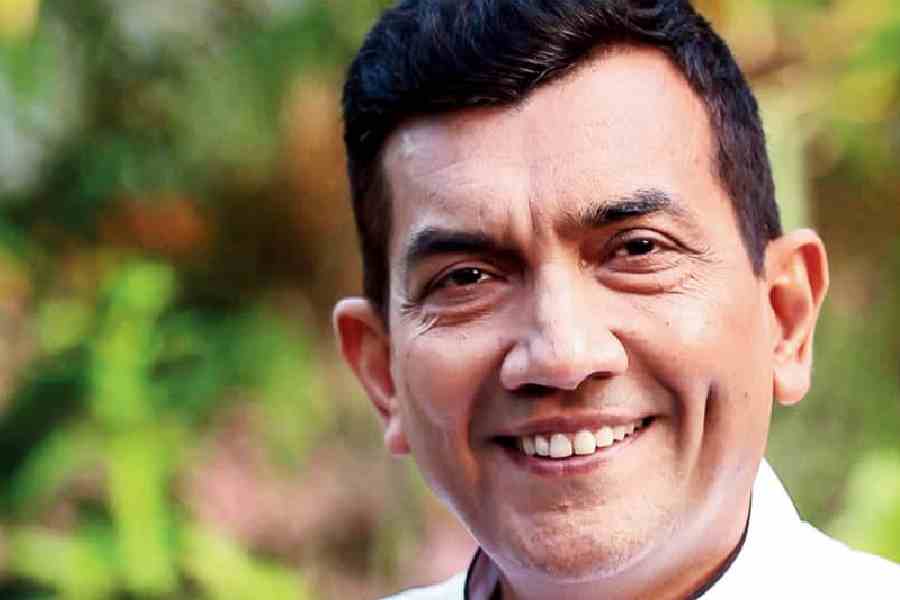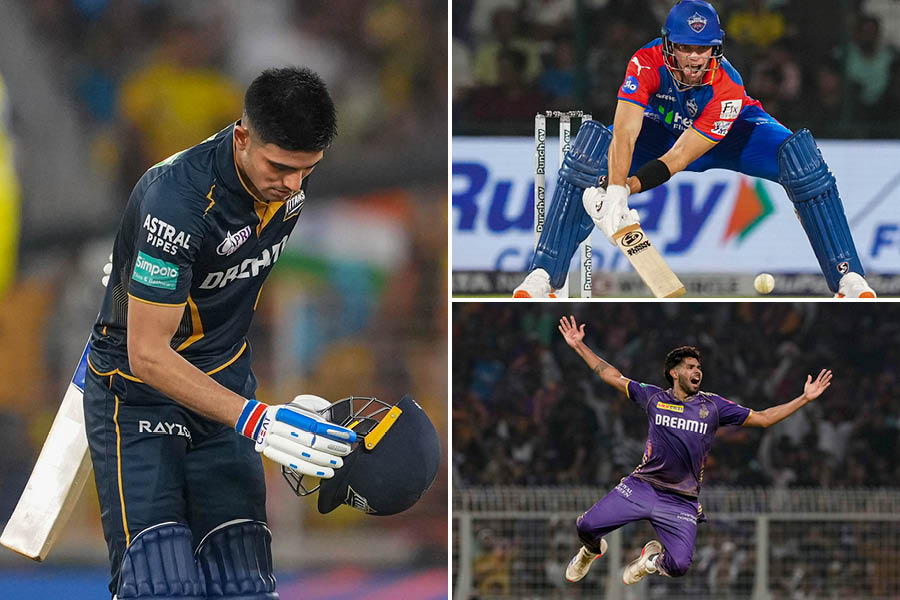The 10th edition of the IIHM Young Chef Olympiad, the annual culinary competition by the International Institute of Hotel Management, is set to begin on January 29. A week ahead of the competition, which will bring together aspiring chefs from various countries across the globe, chef Sanjeev Kapoor visited Calcutta. t2 caught up with the Young Chef Olympiad regular for a chat over breakfast at Novotel Kolkata Hotel & Residences.
As a culinary icon, what initially drew you to the Young Chef Olympiad, and what unique aspects of the competition do you look forward to every year?
I didn’t know about it at all! Suborno Bose, founder and CEO of IIHM, approached me, it was his madness! I always say only a madman can think of something like this because anything which is of this vision or scale needs a madman. It cannot be done by sanity. Because even to choose to think and visualise it needs a lot of guts.
So, when Suborno approached me, I said, “It sounds very good but is it possible?” I had a lot of doubts — was it possible to do something like this, to get students from all over the world to come here, and have them compete? In how many disciplines have we seen that happen? It takes the might of an entire government to put something of this scale together, and for a hotel management institute in Calcutta, to do that… I wasn’t too sure.
I’m glad that something like this is happening. The best part is, it’s no longer Calcutta now, it’s no longer India. The entire world has come together through the YCO, and what is good about it is that it has grown from something that was already big to bigger than big! It’s not like the YCO was insignificant when it began… and now, to bring so many countries to India, and have this opportunity of uniting the world of and through food — it’s remarkable. To bring this kind of harmony in a day and age where physical boundaries exist, when there is division — the fact that food is bringing consensus is truly remarkable. However, I do think that the YCO does not get its fair share of fame or recognition. It deserves much more acclaim.
What are you looking forward to in this year’s competition?
My role is of principal mentor, so that is what I’ll do. See, there is no meaning of just excellence, regardless of what field you’re in. Humanity can only progress when there is harmony in excellence. It is not just countries or students competing with each other here, but their trainers, their supporting teams, their mentors, judges from all over the world, the entire advisory board… and also all the students of this field; not just the IIHM, because this is a global service that the IIHM is doing. So, to put that into perspective, to give it that gravitas, I would say, is my main role.
You’ve been with the YCO since its inception. What are the most significant changes you’ve seen over the years?
I think it has seen all highs and lows. The biggest challenge was Covid. Most people would have wanted to wait, to resume the competition when things went back to normal. But we believed that we should go ahead with it regardless. To have access to technology across the world for judges to see, with multiple live cameras, a competition taking place somewhere entirely different — I think that was a technological miracle, in some sense. And it came out with flying colours, nobody would have imagined that it would work that flawlessly. The camaraderie is becoming bigger and better with each passing year. That, I think, is the purpose. So that’s what I would say, that each passing year, while everyone competes, they help each other simultaneously. They share knowledge, teach each other, and it does not stop at the end of the competition.
What advice would you like to give to young chefs competing this year?
(Laughs) The most important thing is to always be who you are. Don’t try to be someone else. In any competition, it’s good to learn, but the competition itself requires that you learn from the best without losing your individuality. So, learn from all sources. Get inspired by all sources. But when you come out into the spotlight, it should be you, it should not be anybody else. Leadership means that you have to participate. When you do that there is a chance to win, and that’s when you lead. So, I would say be the leader, show the leadership that you already have in you, and create your own following. That’s the most important thing. Winning is incidental.
Looking back at your involvement with the YCO for all these years, what has been some of your personal highlights or memorable moments?
There are countries I had not heard names of. And then you meet the students and understand their culture, and the most exciting part is that every time I meet them, it takes me back to my own student days. I tell them, “If I was as dedicated as you guys are, I would have been much bigger than I am right now!”
How do you envision the future of the Olympiad?
I believe that currently it is owned by the IIHM but this ownership will pass on to India as a country. And then, when it comes to culinary excellence through competitions, the world will look at us and remember us. IIHM has taken the lead, and over the years people will forget Suborno Bose, Sanjeev Kapoor and IIHM but people will remember India and the YCO.
And do you think it’s going to leave a very big impact for the next generation of chefs?
Absolutely. Not just one generation, but generations to come. Something that is done consistently, something that is done with discipline, year after year, is bound to take its own momentum.
Moving away from YCO, how have you seen global food trends evolve in the last few years, and which contemporary trend excites you the most?
I think in the last three or four decades, we have seen it all. From very boring and heavy food to very science-driven froth and foam food, and relatively newer focus on ingredient-based cooking. India has always been very seasonal when it comes to food because previously we didn’t have the advantage of science and technology in this country. We had winter vegetables, winter fruits, we understood what time is best for hilsa.... Somewhere we got excited and lost that understanding; we started to have everything all through the year. Mangoes are probably the only fruit that you’ll still see in summer, but apple, bhindi, cauliflower, carrots you’ll find all through the year now. When I was growing up, that was not the case.
So that is the most exciting part, I would say, where ingredient-based cooking is taking place. People are getting closer to nature, they are trying to understand the ingredient — top restaurant chefs are now going into jungles to find good quality ingredients, they are going into the deep sea to find good quality fish.
Coupled with that, a lot of talk of food that is good for us has started to crop up. For example, last year was the International Year of Millets. So, for the very first time, sustainability is being talked about seriously. We are still far from it, but the good thing is, that talk has begun.
What are the most innovative changes that are happening in Indian cooking today?
I don’t think innovation necessarily needs to be cutting-edge. Innovation, at times, is something that you used to do but may have forgotten, but then you start to do it again. So, renovation is also innovation. And that is the most exciting challenge, that there is an opportunity. There is a lot of historic data that is available, too, so it’s just that we need to work on it. It’s just that we need to find that spark again, and some people are trying to do that.
What is the one food item that you never miss when you’re in Calcutta?
Gundi paan, I think! (Laughs) But, of course, it all depends on how much time I have. So as a rule, whenever I travel, I always eat food that is local.
Do you have a favourite culinary memory from this city?
Oh, multiple! There are so many... as a child, one of the things I used to get fascinated by was the kulfi that they would do in mangoes. I used to think, “Isko aam ke andar kaise bharte honge?” Also the taste of certain things… seeing and using raw mustard oil for the first time… I just loved it. Another example is when I found out that rasgulla can be hot! Gur wala, garam rasgulla bhi ho sakta hai! My aunt used to live here, so as a child, I still remember on Lansdowne Road, there was a small halwai, which later became a big halwai...
(Suborno Bose who sat through the chat prompted: Nepal Sweets)
That’s the one. So they would make rasgulla outside the store. Or how, right outside Sishu Mangal Hospital, they would sell fish… so I have multiple memories of food in this city.
When I started to become known, my biggest problem with this city was that you could not find Bengali food anywhere in the restaurants! 6 Ballygunge Place was not there, Kasturi was not there… the only places that served Bengali food were Aaheli, Suruchi, and Kewpies. There were three places you could go to for Bengali food in the whole city, and that was it!






